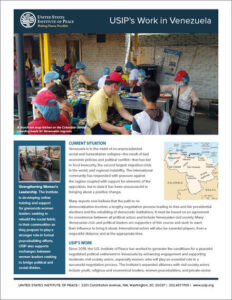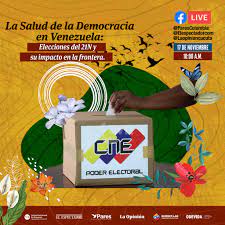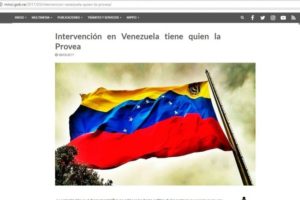 Many experts now believe that the path to Venezuela’s re-democratization involves a lengthy negotiation process leading to free and fair presidential elections and the rebuilding of democratic institutions, says a new USIP analysis.
Many experts now believe that the path to Venezuela’s re-democratization involves a lengthy negotiation process leading to free and fair presidential elections and the rebuilding of democratic institutions, says a new USIP analysis.
It must be based on an agreement for coexistence between all political actors and include Venezuelan civil society. Many Venezuelan civic and political leaders are supportive of this course and seek to exert their influence to bring it about. International actors will also be essential players, from a respectful distance and at the appropriate time, the authors suggest.
Why did efforts to secure a democratic transition in Venezuela fail? asks National Endowment for Democracy board member Elliott Abrams, former Special Representative for Iran and Venezuela. The answers could shed light on conditions and policies for advancing democracy in other states and contexts, he told an American Purpose meeting this week, outlining 10 key factors to explain the policy failure:
- Outside support can allow even a weak or unpopular regime to survive. …. The Maduro regime has received intelligence assistance from Cuba, Russia, China, and Iran, diplomatic support from other autocracies as well as from some Western Hemisphere democracies, and has gotten massive loans from Russia and China. So the regime does not feel isolated and the impact of both international criticism and economic sanctions is weakened.
- Broad economic sanctions that do not directly affect the ruling elites will not change their conduct. The United States imposed broad sanctions on Venezuelan exports but Venezuela’s rulers were still able to move freely throughout Latin America and Europe—and move their money freely as well. In many cases their families lived abroad in splendor on the ill-gotten gains. Sanctions must directly hit the civilian and military officials who run the regime to have maximum impact.
 The population at large must see clearly how it will benefit from political change. The Venezuelan opposition was never able to show citizens that removing the regime would lead to greater prosperity for the country. Polls showed that voters blamed the regime far more than U.S. sanctions for the country’s economic collapse, but that did not mean they believed the opposition could bring better days. Here the United States and other supportive democracies failed….
The population at large must see clearly how it will benefit from political change. The Venezuelan opposition was never able to show citizens that removing the regime would lead to greater prosperity for the country. Polls showed that voters blamed the regime far more than U.S. sanctions for the country’s economic collapse, but that did not mean they believed the opposition could bring better days. Here the United States and other supportive democracies failed….- Regime leaders must see a way out in which they can survive, or they will reject change. Regime leaders must feel pain now, through economic sanctions and travel bans, but must see some way to survive after regime change. If they feel that change means long prison terms and penury, they will fight to the death to resist…..
- Military leaders must see a future both for themselves and for their institution. Despite some efforts by both the United States and the Venezuelan opposition, the military was never persuaded that in a post-Maduro period they would have an important, protected, and honored role. Because they hold the guns, military leaders can prolong or shorten a regime’s period in power, and can press for hard lines or compromise in any negotiations…
-

Provea
Democratic nations must be united in their approach, or the regime will use divisions to weaken the opposition. While there was considerable cooperation among democracies backing the Venezuelan opposition, at key moments a lack of cohesion helped the regime. The EU High Representative worked at cross purposes with the United States at times, pursuing a different path and working with opposition leaders who were not part of the main opposition group. Every such difference is a boon to the regime, allowing it to further divide the opposition and create confusion.
A second report submitted by the UN Fact-Finding Mission on Venezuela to the UN Human Rights Council last September details the Venezuelan justice system’s role in prosecuting perceived government opponents and perpetuating impunity for human rights violations. The Inter-American Dialogue’s Peter D. Bell Rule of Law Program and the Washington Office on Latin America (WOLA) co-host the three members of the UN Fact-Finding Mission on Venezuela: Marta Valiñas, a specialist on international criminal justice and chairperson of the Mission, Patricia Tappatá Valdez, a human rights defender specialized in transitional justice and democracy, and Francisco Cox Vial, a human rights and criminal defense lawyer
The Venezuelan Judiciary and Crimes Against Humanity: Justice or Impunity?
Opening Remarks: Michael Shifter, President, Inter-American Dialogue. Panelists: Marta Valiñas, Specialist on international criminal justice and chairperson of Mission; Patricia Tappatá Valdez, Human rights defender specialized in transitional justice and democracy (@patriciatappata); Francisco Cox Vial, Human rights and criminal defense lawyer (@fcoxvial). Moderator: Carolina Jiménez Sandoval, President, WOLA (@cjimenezDC). 11:00 A.M. – 12:30 A.M. EST TUESDAY, 1 MARCH 2022. RSVP
Follow the event on Twitter #JusticeVenezuela and @The_Dialogue.







